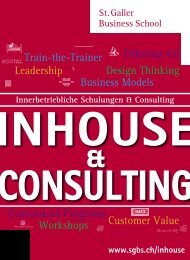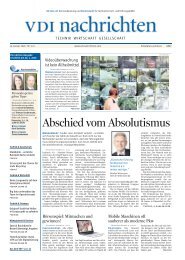Eine gute Führungskraft darf für ihre Mitarbeiter kein Rätsel sein - Interview mit Dr. Christian Abegglen und Markus Franz
EINE GUTE FÜHRUNGSKRAFT DARF FÜR IHRE MITARBEITER KEIN RÄTSEL SEIN. Wer andere Menschen führen und begeistern möchte, sollte vor allem über eine realistische Selbsteinschätzung verfügen. Erst dann kann eine Führungskraft glaubhaft die zahlreichen Rollen ausfüllen, die ihr heute abverlangt werden. Um dabei die richtige Balance zwischen Veränderung und Stabilität zu finden, helfen dogmatische Diskussionen nicht weiter, finden Dr. Christian Abegglen, Geschäftsführender Direktor der St. Galler Business School, und Markus Franz, Leiter der Staufen Akademie. www.sgbs.ch http://sgbs.ch/community/news/detail/eine_gute_fuehrungskraft_darf_fuer_ihre_mitarbeiter_kein_raetsel_sein/
EINE GUTE FÜHRUNGSKRAFT DARF FÜR IHRE MITARBEITER KEIN RÄTSEL SEIN.
Wer andere Menschen führen und begeistern möchte, sollte vor allem über eine realistische Selbsteinschätzung verfügen. Erst dann kann eine Führungskraft glaubhaft die zahlreichen Rollen ausfüllen, die ihr heute abverlangt werden. Um dabei die richtige Balance zwischen Veränderung und Stabilität zu finden, helfen dogmatische Diskussionen nicht weiter, finden Dr. Christian Abegglen, Geschäftsführender Direktor der St. Galler Business School, und Markus Franz, Leiter der Staufen Akademie.
www.sgbs.ch
http://sgbs.ch/community/news/detail/eine_gute_fuehrungskraft_darf_fuer_ihre_mitarbeiter_kein_raetsel_sein/
Create successful ePaper yourself
Turn your PDF publications into a flip-book with our unique Google optimized e-Paper software.
In Dialogue<br />
19<br />
In Dialogue<br />
00 22<br />
00<br />
20<br />
a mw o r k<br />
<strong>Franz</strong>: <strong>Eine</strong> spannende Frage, die auch aus einem anderen<br />
Blickwinkel heraus interessant ist. Denn nicht nur Geld, sondern<br />
auch Prestige <strong>und</strong> Statussymbole haben Führungskräfte<br />
über viele Jahre angetrieben. Diese Denkweise wird nun<br />
durch die Generationen Y <strong>und</strong> Z zunehmend hinterfragt. Die<br />
Entscheidung, ob man zu Unternehmen A oder B geht, wird<br />
immer häufiger davon abhängig gemacht, welche Unternehmenswerte<br />
besser zu den eigenen passen <strong>und</strong> wie man sich<br />
selbst verwirklichen kann – geschäftlich wie privat.<br />
00 25<br />
00 28<br />
<strong>Abegglen</strong>: Lassen Sie mich Folgendes ergänzen. Auch im<br />
beruflichen Umfeld sollten visionäre Ziele verfolgt werden.<br />
Gerade die Top-Führungskräfte müssen das Unternehmen<br />
zum psychologischen Eigentum der <strong>Mitarbeiter</strong> machen <strong>und</strong><br />
Ziele vorleben, <strong>für</strong> die Menschen brennen.<br />
00<br />
Von der Vision zurück zum Alltag. Wie sollte das ideale<br />
Verhältnis zwischen <strong>Mitarbeiter</strong>n <strong>und</strong> Führungskräften<br />
im normalen Miteinander aussehen?<br />
<strong>Franz</strong>: Normal ist das richtige Stichwort. Führungskräfte<br />
sollten sich nicht verbiegen <strong>und</strong> authentisch bleiben. Gefragt<br />
ist ein Klima des offenen Umgangs, der Wertschätzung <strong>und</strong><br />
des Vertrauens. Kommunikation ist dabei ganz entscheidend:<br />
Man sollte sagen, was man tut – aber dann auch tun, was<br />
man gesagt hat.<br />
Aber wie realistisch ist es denn, so offen zu kommunizieren?<br />
Der Vorgesetzte ist in der Regel ja selbst in<br />
Zwänge eingeb<strong>und</strong>en, die es schwierig machen, etwa<br />
Fehler einzugestehen.<br />
<strong>Franz</strong>: Das ist ein gr<strong>und</strong>legendes Problem. Wir müssen von<br />
einer Fehlerkultur hin zu einer Lernkultur kommen. <strong>Eine</strong><br />
lernende Organisation ist nur erreichbar, wenn es „psychologische<br />
Sicherheit“ gibt: Das bedeutet, dass gewisse Dinge<br />
ausprobiert werden können <strong>und</strong> es in Ordnung ist, wenn<br />
nicht das gewünschte Resultat eintritt. Wichtig ist, daraus zu<br />
lernen, entsprechende Verbesserungen umzusetzen, <strong>und</strong><br />
v. a. auch eine Unternehmenskultur, die dies zulässt. Anders<br />
lassen sich <strong>kein</strong>e neuen Wege beschreiten.<br />
of thinking is being questioned with increasing frequency by<br />
members of Generations Y and Z. The decision about whether<br />
to work for company A or company B is being made more<br />
and more often on the basis of which set of corporate values<br />
is a better match with that of the employee and how well the<br />
person can achieve their goals at a given company — professionally<br />
and personally.<br />
<strong>Abegglen</strong>: Please allow me to add something here. Visionary<br />
goals should be pursued in a professional setting as well.<br />
Top managers in particular have to make the company the<br />
psychological property of its employees and lead by example<br />
with goals that people are passionate about.<br />
Turning from the topic of visions back to everyday life:<br />
ideally speaking, what should the relationship between<br />
employees and their managers look like?<br />
<strong>Franz</strong>: The best term here is “normal”: managers should not<br />
try to be someone they are not. They should be authentic.<br />
What we need is a climate of open interactions, appreciation<br />
and good faith. Communication is critical in this context:<br />
people have to say what they are doing, but they also have to<br />
do what they are saying.<br />
But how realistic is it to communicate so openly?<br />
Usually supervisors are caught up in constraints which<br />
make it hard to do things like ad<strong>mit</strong> mistakes.<br />
<strong>Franz</strong>: This is a f<strong>und</strong>amental problem. We have to shift<br />
from a culture of mistakes to a culture of learning. Creating a<br />
learning organization is only possible if there is psychological<br />
security. That means that certain things can be attempted,<br />
and it‘s all right if the desired result is not attained. What is<br />
important is learning from those situations, implementing the<br />
appropriate improvements and, above all, creating a corporate<br />
culture that makes this approach possible. There is no<br />
other way to blaze new trails.<br />
We are in the midst of a digital transformation.<br />
What does this mean when it comes to leadership?<br />
„Auch im beruflichen<br />
Umfeld sollten visionäre<br />
Ziele verfolgt werden.“<br />
“Visionary goals should be pursued in<br />
a professional setting as well.“<br />
Wir stehen <strong>mit</strong>ten in der digitalen Transformation.<br />
Was bedeutet dies <strong>für</strong> das Thema Führung?<br />
<strong>Abegglen</strong>: Egal ob nun Digitalisierung oder künstliche<br />
Intelligenz, sie bieten vor allem neue Führungsgr<strong>und</strong>lagen im<br />
Sinne besserer <strong>und</strong> schnellerer Informationen. Dennoch lässt<br />
sich Führung nicht automatisieren. Wer nur auf Management<br />
durch bessere Datenverwaltung setzt, ist <strong>kein</strong> Leader, sondern<br />
ein Controller. Sicher wird die Digitalisierung auch qualitative<br />
Veränderungen bringen, etwa <strong>für</strong> die <strong>Mitarbeiter</strong> eine<br />
neue Dimension der Selbststeuerung. Doch das spricht eher<br />
da<strong>für</strong>, dass die gr<strong>und</strong>legenden Fähigkeiten der Führungskräfte<br />
noch mehr in den Fokus rücken müssen. Als reine Verwalter<br />
sind sie hingegen noch weniger gefragt als zuvor.<br />
Lange war Lean Management das Maß aller Dinge in<br />
der Unternehmensorganisation. Erleben wir nun einen<br />
Paradigmenwechsel?<br />
<strong>Abegglen</strong>: Letztlich sind Managementbegriffe immer eine<br />
Frage der Betrachtungsweise. Ständige Veränderung ist das<br />
eine, aber Stabilität ist ebenfalls eine wichtige Größe <strong>für</strong><br />
erfolgreiches Arbeiten. In der Realität ist permanente Veränderung<br />
menschlich nicht zu leisten, entsprechend verbindet<br />
Lean die Faktoren einer kontinuierlichen Verbesserung <strong>mit</strong><br />
der Stabilität eingeübter Prozesse. Im Kern propagieren auch<br />
derzeit populäre Managementmethoden wie etwa Agilität<br />
nichts gr<strong>und</strong>legend Anderes.<br />
<strong>Franz</strong>: Genau, es gibt viele Gemeinsamkeiten <strong>und</strong> wechselseitige<br />
Ergänzungen. Lean Management ist <strong>für</strong> mich<br />
verb<strong>und</strong>en <strong>mit</strong> „ges<strong>und</strong>em Menschenverstand“, „Hausaufgaben<br />
machen“ <strong>und</strong> der Entwicklung einer „wertschätzenden<br />
Lernkultur“. Ergo wird Lean immer <strong>sein</strong>e Berechtigung haben,<br />
auch als funktionierende Gr<strong>und</strong>lage <strong>für</strong> neue Ansätze <strong>und</strong><br />
zukünftige Trends.<br />
___________________________________________________________________<br />
Seit 2018 bieten die St. Galler Business School <strong>und</strong> die Staufen<br />
AG gemeinsam Managementseminare sowie das Ausbildungsprogramm<br />
zum „Executive Leader“ an.<br />
www.executive-leadership-program.de<br />
<strong>Abegglen</strong>: No matter whether the topic is digitization or<br />
artificial intelligence, a new fo<strong>und</strong>ation for management is<br />
emerging, and it involves better and faster information. That<br />
said, leadership is still not something that can be automated.<br />
People who place their faith in leadership through better<br />
data management are not leaders, they are comptrollers.<br />
Digitization will certainly bring about qualitative changes too,<br />
such as a new dimension of self-management for employees.<br />
But that is an argument in favor of focusing even more on<br />
the f<strong>und</strong>amental abilities of managers. There is less demand<br />
than ever for them to serve as pure administrators.<br />
For a long time, Lean management was the be-all and<br />
end-all in organizational structures. Are we experiencing<br />
a paradigm shift?<br />
<strong>Abegglen</strong>: Ultimately, management terms are always a question<br />
of your perspective. Constant change is one thing, but<br />
stability is also an important indicator when it comes to working<br />
successfully. Realistically speaking, permanent change<br />
is not humanly possible. Lean thus combines the factors of<br />
continuous improvement with the stability of well-rehearsed<br />
procedures. Basically, the management methods that are<br />
currently en vogue do not espouse anything different than<br />
agility does.<br />
<strong>Franz</strong>: Exactly. There are a lot of points in common and<br />
mutually complementary information. To me, Lean management<br />
is linked to common sense, doing your homework and<br />
developing a learning culture of appreciation. Ergo, Lean will<br />
always have its place, including as a functional basis for new<br />
approaches and tomorrow‘s trends.<br />
___________________________________________________________________<br />
As of 2018, St. Galler Business School and Staufen are jointly<br />
offering management seminars and a training program to<br />
become an Executive Leader.<br />
www.executive-leadership-program.de<br />
42 43

















